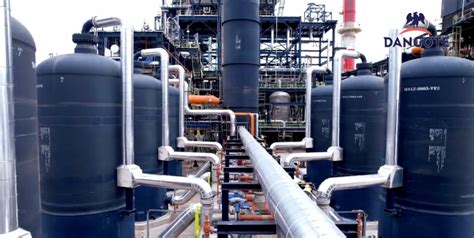The Dangote Petroleum Refinery, one of Africa’s largest and most ambitious refinery projects, is set to receive 12 million barrels of crude oil from the United States, according to The Africa Report.
This development underscores the challenges the $20 billion facility faces as it struggles with insufficient local crude supply to meet its refining goals. The shipment, which departed the U.S. recently, is expected to arrive in Nigeria by February, further highlighting the growing reliance on international sources to fuel the refinery’s operations.
The Dangote refinery, located in Lekki, Lagos State, aims to ramp up its refining capacity to 650,000 barrels per day (bpd) by June 2025. However, local supply issues have hindered progress. The Nigerian National Petroleum Company Limited (NNPC), the country’s state oil company, has faced difficulties in meeting its obligations to supply enough crude oil to the refinery.
An insider source told The Africa Report, “About 12 million barrels of crude have departed the US and should arrive in Nigeria by February.” This import is a strategic move to ensure the refinery’s production targets are met amid local supply shortages. While the Dangote refinery has already increased its output to about 500,000 bpd, achieving its target of 650,000 bpd by mid-year remains a significant challenge without steady access to crude oil.
NNPC is currently struggling to provide the Dangote refinery with the 350,000 bpd required from the 450,000 bpd allocated for Nigeria’s domestic consumption. This mismatch has led refinery officials to look beyond Nigeria’s borders for the necessary feedstock. According to a refinery official, “Currently, we are at 500,000 bpd; we will ramp to 650,000 by midyear. You know what it means? So, it is a normal process to source crude oil anywhere it is available.”
In response to the ongoing challenges, the Dangote refinery is actively seeking to bolster its crude oil storage capacity. The facility is constructing eight additional tanks, increasing its storage by 41.67% to a total of 3.4 billion liters. “Importing crude from other countries instead of buying locally means that our crude stockpiles will have to be higher,” explained Devakumar Edwin, Vice President in charge of the oil and gas business at Dangote Industries.
The refinery’s decision to import crude oil comes at a time when President Bola Tinubu’s government has been pushing for a “naira-for-crude” deal. Since July 2024, the Nigerian government has directed the NNPC to sell crude oil to local refineries in naira, a move aimed at stabilizing Nigeria’s foreign exchange reserves. In October 2024, the government further restricted the sale of crude to only those refineries involved in petrol production, initially focusing on the Dangote refinery.
Although the refinery is benefiting from the naira-for-crude arrangement, sources within the industry acknowledge that the NNPC’s crude supply remains insufficient. The Dangote refinery was expected to require 550,000 barrels of Nigerian crude daily to meet its full production needs, amounting to approximately 17 million barrels per month. However, with local supply falling short, Dangote has had no choice but to source additional crude from global markets.
As part of its long-term strategy, the Dangote refinery had previously issued a term tender for two million barrels of West Texas Intermediate (WTI) Midland crude monthly, for 12 months starting in July 2024. This tender for a total of 24 million barrels in one year is further evidence of the refinery’s growing dependence on international crude suppliers.
The Dangote refinery is already playing a crucial role in Nigeria’s fuel production, supplying gasoline, diesel, and aviation fuel both domestically and to international markets. Despite the logistical hurdles, the refinery remains optimistic about achieving its ambitious refining targets, with plans to expand its capacity and reduce Nigeria’s reliance on imported refined products.
Refinery officials are hopeful that the situation will improve as local crude supply stabilizes. However, the reliance on imported crude highlights the fragility of Nigeria’s oil supply chain and the challenges faced by the country’s refining industry.
As the Dangote Petroleum Refinery continues its journey toward full capacity, the importation of crude oil from the United States marks a critical moment in the project’s development. Whether local suppliers, such as the NNPC, can meet the demand of such large-scale refineries in the future will be key to the country’s energy security and economic stability.
The situation also emphasizes the need for continued reforms in Nigeria’s oil sector, with the government’s commitment to increasing the capacity of local refineries likely to play a pivotal role in the country’s energy future.
Source: Africa Report








Awesome site you have here but I was curious if you knew of any user discussion forums that cover the same topics talked about here? I’d really like to be a part of community where I can get feed-back from other knowledgeable individuals that share the same interest. If you have any recommendations, please let me know. Cheers!
I am not sure the place you are getting your info, however great topic. I must spend a while studying much more or working out more. Thanks for great info I was in search of this info for my mission.
I dugg some of you post as I thought they were invaluable handy
It’s perfect time to make some plans for the future and it’s time to be happy. I have learn this publish and if I could I desire to counsel you few interesting issues or advice. Perhaps you could write next articles referring to this article. I desire to learn even more issues about it!